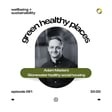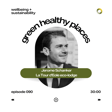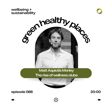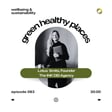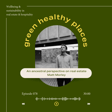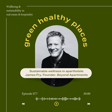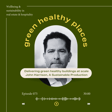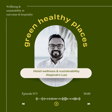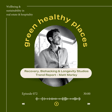Introduction to the Podcast
00:00:10
Speaker
Welcome to episode 80 of the Green Healthy Places podcast, in which we discuss the themes of wellbeing and sustainability in the built environment. I'm your host, Matt Morley, and in this episode we are exploring a specifically human aspect of our environment to do with psychology.
Meet Dr. Michelle Constable
00:00:29
Speaker
Guiding us through is Dr. Michelle Constable, a chartered health psychologist with more than 15 years experience of applying behavioral science in practice, developing interventions at individual community and population levels. Her specialty is really in translating research into practice and embedding behavioral science across organizations and systems. She co-founded the Behavioral Science and Public Health Network, a charitable organization developing and supporting behavioral science communities in the yeah UK. And she also runs the Behavioral Scientists
00:01:02
Speaker
which builds on that work and brings together a unique offer for organizations in the Middle East to support and develop their behavior change agenda.
The Behavioral Scientists Consultancy
00:01:12
Speaker
Let's jump into it. Could you give us ah an overview of the business that is now the behavioral scientists, where you operate from and the team that you have around you? Yeah, very happy to do that. and The behavioral scientists, I mean, we were a consultancy that applies behavioral science research and practice to develop an understanding of how people really think, feel, and behave. And we use those evidence-based insights to provide solutions that are tailored to organization and outcomes um to drive success for our clients. I'm very lucky. We have a brilliant team. All of the team are qualified behavioral scientists, and they've got lots of experience in him
00:01:56
Speaker
in translating research into practice and there can sometimes be a real gap there around um there's lots of research and there's lots of evidence but actually making that meaningful for people and applying it in the real world can be a bit of a challenge.
Challenges in Translating Research
00:02:10
Speaker
So that's where we specialise and the team have worked across all sorts of sectors so across commercial, non-for-profit, government and health so we've got a really brilliant team.
00:02:21
Speaker
it It reminds me a little bit of some of the challenges I face in the realm of of biophilic design, where there is a lot of research out there, and then you're trying to make something accessible to a client, but also practical, functional, and something they can grasp. So presumably you're also dealing with having to filter the research that exists out there and make this concept of behavioral science ah clear and easy for them to understand. So perhaps we could define that before we go any further. how do you see this world and how do you explain it to a client who's just perhaps ah dipping their toe into this water?
Pragmatic Approaches in Consultancy
00:02:57
Speaker
Yeah, I mean, I think we take a very pragmatic approach to this. And um what we try to do is we come from the approach of mapping our skill set with our clients. We don't have all of the information or all of the answers. So we work with them to develop an understanding of their unique issue that they're trying to solve.
00:03:18
Speaker
And what we're able to do through you applying some of the behavioral frameworks is we bring the evidence together, we do some research, and then we're able to play it back in a way that's understandable. Often, and I don't know if you find the same thing, but they can be a big dollop of sort of, so what, when people see research outcomes and things, and it's like, well, how do I actually put that into practice? So we work with them to understand the context and to bring all of the information together.
00:03:48
Speaker
And then our frameworks help provide that understanding. So our consultancy framework, we use the behavior change wheel and the combi, which provides a really useful baseline that people find very accessible and easy to understand. And so if we go a level deeper, i what but problem might an organization be trying to fix or what type of client might come to you and what would they initially ah bring as a brief?
00:04:16
Speaker
All sorts, all sorts of things and think about people and behavior is everything generally involves ah people in the way that they respond to things. So the client might be coming to us fundamentally, it's generally around trying to increase their understanding of an issue that they're facing. So if you're looking at the sustainability agenda that could be around how do you engage with people to increase recycling or um It might be active travel. How do we support people to be more active or in terms of their physical health? So there are lots of challenges um that people come to us with, but also it might be things like we have particular issue within our workplace in terms of um high levels of sickness absence or building resilience with people.
00:05:07
Speaker
It might be training and there's all sorts of different reasons that people come to us and they use us in a variety of ways. Fundamentally, they're either trying to understand a problem, they may want a solution developed, so they may just want recommendations on how to address that and increase their understanding. They might be looking to change social norms around something.
00:05:30
Speaker
um But really it is, they've got a bit of a ah knotty problem that they don't quite understand why they're not seeing the change they might have hoped for. with some of the measures they've already put in place. Right. I think there we've got it. So, you know, I would in that case be perhaps charged with creating the stage upon which certain behaviors could potentially play out. So i don't know we implement an active travel policy or we create an active travel facility where people can come into the workplace, ah whether it's jogging, walking by bicycle or an e-scooter, whatever it might be. They have a space to to change, shower, get ready.
00:06:09
Speaker
uh but then perhaps that space isn't being used because there's not hasn't been communicated right there's something that's not working at an internal organization level the facility by itself i'm often quite conscious of that is that you know you can take a horse to water but in the end like the organisation has to to sort of yeah adapt and evolve in line with it. Just creating a certain facility or implementing a sustainability policy often isn't enough without that additional piece. So as I see it, you're then charged with creating the change internally right to make use of whatever plan or facility might have been implemented.
Bridging Gaps with Behavioral Science
00:06:44
Speaker
Exactly. There's often a gap between desired outcomes and what's happening in practice. And that's where behavioural science can help.
00:06:53
Speaker
because behavioural science will provide the understanding of the barriers and facilitators to change. Now, it's really important that we understand that behaviour is part of a system, so behaviours don't exist in isolation. So there's lots of things that influence our behaviour, such as where we work, where we live, our education, all sorts of different things, our social groups. All these things influence how we behave. So we come in, we look at that kind of wider picture,
00:07:23
Speaker
We look at the behaviors that are happening in practice, and we look at the people that are involved, and we also look at the influences on those behaviors. Now, by doing that, you can help to understand um where resources are best targeted, what are the barriers and enablers to be able to support the change that you're looking to see. And that does a couple of things. It it does target resources, but it also creates a shared understanding um what the issue actually is. So sometimes we can end up targeting what we think or we assume the problem is, but we can actually be targeting in the wrong place because the belief systems, barriers, facilitators can be different than the assumptions that we sometimes make. So we can develop solutions based on partial understanding
00:08:13
Speaker
If you have the behavioural science added in as that kind of additional lens, it helps to crystallise what the problem is and how you can best um resolve it.
00:08:26
Speaker
So would there be a case in which you might make more sense for that process you've just described to happen before say some new additional plan strategy facility was added in in order to sense check that there was a logic and a sort of a desire for it within the organization or is it typically an organization making a decision saying look we need to go in this direction ah we're implementing some ESG policies internally this is what's going to happen and then the issue happens further down in the chain and that's where you'll come in to fix it or does it happen earlier in the process and then that is integrated into the strategic implementation sort of beforehand. At what point do you typically come in?
When to Engage Behavioral Science Experts
00:09:08
Speaker
ah Ideally from the beginning and helping to bring together the evidence for what works and what doesn't and to do the research to understand what people actually want and how they want to use things and what messages they want to receive
00:09:23
Speaker
ultimately, what motivates people to change, because we tend to think about things in terms of knowledge and skills, we might think of things in terms of having the opportunity. um And this is a bit like you were saying earlier, he sometimes the motivation that gets mixed, missing things in terms of what do people actually want and what will motivate them to make that change. So ideally, having that knowledge at the beginning would be perfect. um However,
00:09:53
Speaker
We can come in when it's further down the line and help to refine and revise programmes. And ultimately, I think one of the important things that we do is we can help to evaluate what works and what doesn't, because I think that's really important in terms of making change.
Integrating Behavioral Science into Organizations
00:10:11
Speaker
It seems that we're but both in different ways focused on and ultimately trying to create happier, healthier, more productive workforces that are in line with that particular organization's strategy. So what what recommendations from your perspective in terms of behavioral science would you would you give perhaps some sort of you top tips in terms of what a company or an organization should be doing? Would it classify as human resources? Is it more sort of internal communications? How does that typically play out in terms of what you do? It's interesting because it it can come into any of those different points
00:10:52
Speaker
Typically, we will come in and we'll try and understand the problem in context in in as much detail as we can. Now, it's really important to understand that one size doesn't fit all. So what will work for one group of people won't work for another. So if you think about people in terms of a matrix, if you like, so you might have age cross one side and and then different perhaps ethnic groups across the other.
00:11:18
Speaker
what will work for one person. So say a young Muslim man will not typically work for an older person. So I think we need to understand who we're trying to change or who we're trying to target um and build that understanding. So the first part of the work is always around creating the understanding. And then we move into what are the recommendations for change that will go through the process of a behavioral analysis. And we will then make the recommendations for change.
00:11:47
Speaker
but It can be through HR and often with workforce changes that might well be the case, but also it could be other organisational leads such as um operational leads and there may be areas within the business such as processes that are not working and or issues around productivity and things. So it can be applied across organisations to different issues.
00:12:15
Speaker
And so I think that gives a good sense of your consultancy process. And then the actual outputs themselves, that does it ever take on any kind of like a physical manifestation, like I don't know, some kind of a guideline book that's shared or any kind of piece of communication or is it all delivered sort of behind the scenes and filtered through by the organization itself? Like in terms of the actual outputs of the consultancy process, how does that how does that live after perhaps you've moved on or do you then help to implement and roll it out?
00:12:46
Speaker
Yeah, so a we will develop an approach and it might be that that approach is then taken forward and we develop the intervention or program itself and support with the development and implementation of that. So this is where the collaborative working comes. So the output might be something like, if you like at the beginning, and this is the behind the scenes understanding part, the systems map, it might be a behavioural analysis, it might be the recommendations or policies for change. In terms of the things that happen in in practice, it might be that we then develop a new process within the organisation and that that's something people are engaging with. If it's client focused, as in public focus,
00:13:34
Speaker
It might be that it's a new program to increase active travel that we are then trialing in an area, a town locally, before it's rolled out more fully. It might be that it's communications or we're working currently on a toolkit to support people. So there are lots of different outputs that this can be, and it does depend on what the need of the client group is to make sure that's relevant. But I think one of the important things is that it's not just the messages that we put out that are important, but the messengers as well. So by understanding at the beginning the influences on behaviour, we can then work out the best way for people to receive that information from people that they resonate with, that they actually want to hear and receive information from because otherwise
00:14:27
Speaker
you can be hitting a bit of a flat note with your communications. And again, it's about the and building those behavioral factors into communication. So building not just knowledge for people that there's something happening here and go and attend it. It's also the benefits from that and what motivates people within that.
00:14:50
Speaker
Yeah, sort of really working at a micro level on a sort of individual case, case by case basis and understanding how yeah those motivating factors that each type of employee might have. Yeah, I mean, it could be employees or it might be um it might be customers for for the client that we're we're looking to understand. So, he yeah, it can be variable, but yes, it is about not taking a cookie cutter approach.
00:15:20
Speaker
to behaviour change because, as I say, one size really doesn't fit all. So you can fall wide of the mark if you don't understand the group that you're working with and then making those changes appropriate for them.
Public Health Strategies in the UK
00:15:34
Speaker
And I noticed that you're also doing some more, let's say, sort of macro level work, strategic work in the UK around improving population health and and wellbeing by applying behavioural science and social sciences. I was intrigued to know a little bit more about that. Perhaps you could tell us more.
00:15:49
Speaker
Yeah, the strategic work really came about because a few years ago, um you know, even as recently as maybe 2016, 17, behavioral science in the yeah UK was not very well understood or people didn't see how they would apply it or how it could be used to support and public health outcomes for our population.
00:16:14
Speaker
There's a big synergy between health and behavioral science and the strategic work really seeks to support that kind of development in terms of how we use behavioral and social sciences to improve outcomes for our population. So we were working to develop this agenda locally.
00:16:39
Speaker
And we were talking to what was then Public Health England. And what was clear was that people didn't understand what Google looked like. If they wanted to use behavioral science, where would they get the expertise to be able to do that? And how do they access it? And really, what are the opportunities within them? So we worked together with Public Health England colleagues to develop a strategy. And we brought together about 50 different organisations from across the UK.
00:17:09
Speaker
to feed into this, looking at a variety of different behavioral science disciplines, but also health, professional bodies, all sorts of different stakeholders coming together to create a bit of a roadmap to be able to support behavioral science. Now, things have changed a lot since then, and that's really fantastic. I mean, COVID really so put a spotlight on behavioral science and the importance of behavior, particularly in health change.
00:17:38
Speaker
So um there's real growth now here in this area, but it's a journey. It's one that we're still on, but it's really fantastic to see behavioral science being more broadly used to promote and support public health outcomes in the UK. And I was impressed to see you also founded your own charity, so it's the Behavioral Science and Public Health Network, the BSPHN. What's the remit of that organization?
00:18:07
Speaker
So the BSPHN existed in another format ahead of the strategic work, actually. And we were called the Health Psychology of Public Health Network. And that's really where we started to understand the need for a broader piece of work um around creating, if you like, this shared understanding. So we were a community of practice.
00:18:31
Speaker
bringing together public health and health psychology colleagues. And when we developed the strategy, the BSPHN expanded its remit and became a behavioral science-based organization. And really, we are the community of practice supporting the embedding of the strategy. So we bring together people on a national and regional level to share best practice. And I have to say it's a real passion project for me. I love the BSPHN. It's a great way for practitioners to learn and share about how they can support and use behavioural science to support public health outcomes. But additionally, it creates those opportunities
00:19:22
Speaker
with organisations such as researchers and academics. It's a safe place for trainees to come and share their early career work. And it's a really, really fantastic organisation and community of practice. Yeah, it's something I'm very proud to be involved with.
Expansion to the Middle East
00:19:41
Speaker
And just to loop back round to an earlier point then, the connection with the Middle East?
00:19:46
Speaker
OK, so some funny things happen with with the development of technology actually and and COVID. So the Middle East, um I made a connection firstly when we were asked to give a talk around public health and behavioural science to the Ministry of Health in Amman. And through that, it became those contacts and further conversations. I think that the availability of the knowledge and skills in behavioural science is probably where the UK was maybe a few years ago. So it's still being developed and understood. And as I say, that's still happening in the UK. So we decided that there was a need for a behavioural science consultancy out there to start to provide some expertise. And this is where I think having a qualified team is really important.
00:20:43
Speaker
because we want to work in a sustainable, ethical and high quality way that provides a really good service to organizations out in the Middle East to help them to understand ah behavioral science, how it can be applied to but business outcomes or population outcomes. and But we also work not just in the Middle East, we're working with clients in the USA and also in the UK. So yeah, I think the behavioral science agenda is now global.
00:21:13
Speaker
And it has so much to offer ah in terms of supporting effective change and and delivering on some of the really positive outcomes that we're looking for um across the world. And looking down the line for the for yourself, for the work you do, for the business, what do you have coming in the next year or two or where would you like to see things develop?
Future Plans and Toolkit Development
00:21:39
Speaker
Well, I think at the moment we're doing some work developing toolkits. We've got training packages that are going to be coming out. um We're really looking and there seems to be particular interest in the area around understanding behavioral systems. So that's something that we're going to be looking to develop and support organizations with because I think that's the starting of understanding in terms of where to target resources and understanding the problem, getting that shared approach to to develop new programs. So it's a really exciting time. I'm very excited to be involved in in the behavioural scientists.
00:22:20
Speaker
really looking to encourage people to reach out to us. If you want to know more, come and have a chat.
Contact and Further Engagement
00:22:25
Speaker
There you go. Okay. So are you, do you put out a lot of content? Do you, I know you had the behavioral scientists with an s dot.com. ah you Do you do the social media thing? Do you prefer to sort of engage on a an online call? What's typical sort of communications piece looking like? So we're definitely on LinkedIn so people can reach out to me directly. I'm on LinkedIn as Dr. Michelle Constable.
00:22:48
Speaker
um But also the behavioral scientist has its own LinkedIn page and also through our website, there's a contact form. But yeah, do feel free to get in touch. The website address is the behaviouralscientist.com. So please do yeah get in touch. And yeah, but we we are very happy to have initial conversations online with people.
00:23:10
Speaker
and start to have that understanding of their organizational needs and how we can help. Amazing. Thank you so much. That was a really, really enjoyable and insightful conversation. Thanks, Michelle.

